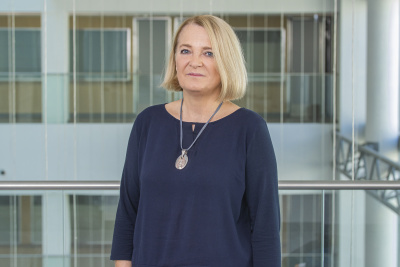
Prof. M. Błażek; photo by P. Sudara (thanks to the kindness of Medical University of Gdańsk)
‘While respecting the autonomy of universities, we should strive to harmonise regulations in such a way as to create equal working conditions at all Polish universities,’ says dr hab. Magdalena Błażek, prof. UG, Deputy Ombudsman for Equal Treatment and Anti-Mobbing at the University of Gdańsk and member of the Ministry of Science and Higher Education's expert team. The team's first meeting took place in June 2025.
The Minister of Science and Higher Education, Marcin Kulasek, by order 16 June 16, 2025, appointed a team to identify good practices and develop mechanisms to counteract mobbing, support the well-being of people working and studying in the higher education and science system, and prevent mental health problems in the academic environment. Among the 21 members of the Team is dr hab. Magdalena Błażek, prof. UG. Prof. M. Błażek serves as Deputy Ombudsman for Equal Treatment and Counteracting Mobbing at the University of Gdańsk. She is also the Rector's Plenipotentiary for Well-being at MUG and heads the MUG Quality of Life Research Department.
The main tasks of the expert team include:
- conducting an analysis of the legal status of mobbing in the workplace, including a detailed analysis of internal regulations adopted in this area in higher education and science institutions;
- identifying areas where vertical, horizontal or diagonal mobbing in higher education and research institutions, analysing identified examples and manifestations of mobbing (using anonymised data) in these institutions, and conducting analyses of the possibility of undesirable phenomena occurring in the academic environment that are directly or indirectly related to mobbing;
- developing proposals for systemic solutions, in particular legislative ones, in the higher education and science system aimed at counteracting mobbing and discrimination in the academic environment, including the development of procedures in the event of mobbing and protective mechanisms for the person reporting mobbing and the person reporting it on behalf of a third party;
- analysis of solutions adopted in higher education and science institutions covering mental health and well-being support for people working and studying in this system, as well as a review of anti-mobbing measures in these institutions;
- preparation of targeted recommendations on mental health support in the academic environment and detailed recommendations covering measures to promote the well-being of people working and studying in the higher education and science system.
‘While respecting the autonomy of universities, we should strive to harmonise regulations in order to create equal working conditions at all Polish universities,’ said prof. Magdalena Błażek after the first meeting of the Team.
The Office of the Ombudsman for Equal Treatment and Anti-Mobbing has been operating at the University of Gdańsk since 2019. It was established by the Rector in response to a request from the University's Social Responsibility Committee and a recommendation from the Ombudsman for Civil Rights. The Office is responsible, among other things, for implementing and promoting good practices in the field of equal treatment and creating a friendly working environment, organising training for employees and examining complaints concerning situations that appear to constitute mobbing. A procedure for dealing with mobbing or discrimination has been introduced, which ensures that every member of the academic community can seek support if they become a victim of reprehensible practices.
‘At the University of Gdańsk, we have been working very efficiently for many years to counteract mobbing and discrimination. Any problems that arise are dealt with on an ongoing basis,’ added prof. Magdalena Błażek. ‘It is worth noting that they are often caused by interpersonal conflicts and problems with implementing proper communication and management skills.’
The expert team will work from June 17 to December 31, 2025. The work in the team is pro bono and does not involve any financial benefits.
We warmly congratulate the Professor and wish her fruitful work!
